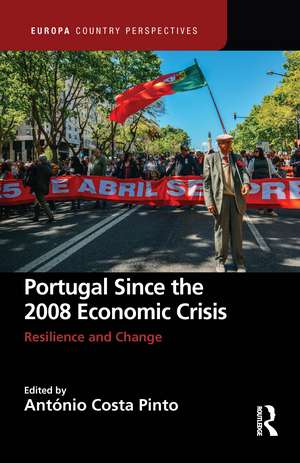Portugal Since the 2008 Economic Crisis: Resilience and Change: Europa Country Perspectives
Editat de António Costa Pintoen Limba Engleză Hardback – 11 mai 2023
The volume is accessible to a broad academic audience, with chapters examining economic, political, social and foreign policy issues, for scholars interested in an analysis of Portugal’s emergence from the economic crisis.
| Toate formatele și edițiile | Preț | Express |
|---|---|---|
| Paperback (1) | 389.66 lei 6-8 săpt. | |
| Taylor & Francis – 27 mai 2024 | 389.66 lei 6-8 săpt. | |
| Hardback (1) | 1000.27 lei 6-8 săpt. | |
| Taylor & Francis – 11 mai 2023 | 1000.27 lei 6-8 săpt. |
Din seria Europa Country Perspectives
-
 Preț: 273.26 lei
Preț: 273.26 lei -
 Preț: 387.75 lei
Preț: 387.75 lei -
 Preț: 396.60 lei
Preț: 396.60 lei -
 Preț: 380.78 lei
Preț: 380.78 lei -
 Preț: 389.66 lei
Preț: 389.66 lei -
 Preț: 449.41 lei
Preț: 449.41 lei -
 Preț: 388.30 lei
Preț: 388.30 lei -
 Preț: 389.66 lei
Preț: 389.66 lei -
 Preț: 386.00 lei
Preț: 386.00 lei -
 Preț: 385.04 lei
Preț: 385.04 lei -
 Preț: 198.45 lei
Preț: 198.45 lei -
 Preț: 172.82 lei
Preț: 172.82 lei - 18%
 Preț: 1000.76 lei
Preț: 1000.76 lei - 17%
 Preț: 251.10 lei
Preț: 251.10 lei -
 Preț: 436.74 lei
Preț: 436.74 lei -
 Preț: 389.66 lei
Preț: 389.66 lei -
 Preț: 388.30 lei
Preț: 388.30 lei -
 Preț: 386.39 lei
Preț: 386.39 lei -
 Preț: 383.71 lei
Preț: 383.71 lei - 30%
 Preț: 258.70 lei
Preț: 258.70 lei -
 Preț: 449.41 lei
Preț: 449.41 lei -
 Preț: 381.98 lei
Preț: 381.98 lei -
 Preț: 381.00 lei
Preț: 381.00 lei - 18%
 Preț: 1002.02 lei
Preț: 1002.02 lei -
 Preț: 436.14 lei
Preț: 436.14 lei - 17%
 Preț: 253.67 lei
Preț: 253.67 lei
Preț: 1000.27 lei
Preț vechi: 1219.84 lei
-18% Nou
Puncte Express: 1500
Preț estimativ în valută:
191.40€ • 208.56$ • 161.28£
191.40€ • 208.56$ • 161.28£
Carte tipărită la comandă
Livrare economică 23 aprilie-07 mai
Preluare comenzi: 021 569.72.76
Specificații
ISBN-13: 9781857439618
ISBN-10: 1857439619
Pagini: 300
Ilustrații: 36
Dimensiuni: 156 x 234 x 16 mm
Greutate: 0.45 kg
Ediția:1
Editura: Taylor & Francis
Colecția Routledge
Seria Europa Country Perspectives
Locul publicării:Oxford, United Kingdom
ISBN-10: 1857439619
Pagini: 300
Ilustrații: 36
Dimensiuni: 156 x 234 x 16 mm
Greutate: 0.45 kg
Ediția:1
Editura: Taylor & Francis
Colecția Routledge
Seria Europa Country Perspectives
Locul publicării:Oxford, United Kingdom
Public țintă
General, Postgraduate, and Undergraduate AdvancedCuprins
List of illustrations, The Contributors, Introduction, 1. Portuguese Democracy at 50, 2. European Misfit: The Portuguese Economy after EU Membership, 3. Social Movements and Political Protests in Portugal during and after the Austerity Crisis, 4. European Economic Narratives and the Emergence of a European Public Sphere in Portugal: An Analysis of National Mainstream Newspapers, 5. Presidents and Governments in Portugal: Variations on a Constitutional Theme (2008–2022), 6. Patterns of Ministerial Recruitment, Partisanship and Financial Crisis, 7. Continuity and Change in Portuguese Politics: Towards a more Polarized Party System?, 8. The Populist Radical Right in 21st-Century Portugal, 9. Cultural and Religious Diversity in Portugal, 10. Portuguese Foreign Policy and Crisis Diplomacy in a Period of German Hegemony: Bandwagoning or Soft Balancing?, 11. Portugal’s Role in the EU since 2007: Small State or Equal Partner?, 12. Portuguese Participation in the EU PESCO and NATO as an Interoperability Hub, Index
Notă biografică
António Costa Pinto is a research professor at the Institute of Social Sciences, University of Lisbon and a Professor of Politics at Lusófona University, Portugal. He has been a visiting professor at Stanford University and Georgetown University, USA, a Senior Associate Member at St Anthony's College, Oxford, UK, and a Senior Visiting Fellow at Princeton University and at the University of California, Berkeley, USA. His research interests include authoritarianism, political elites, democratization, and transitional justice in new democracies.
Descriere
Portugal joined the European Union (EU) in 1986, but the enduring legacies of the country’s transition process from authoritarianism to democracy became apparent during the European sovereign debt crisis, when Portugal experienced its third bailout since the institutionalization of democratic government.
